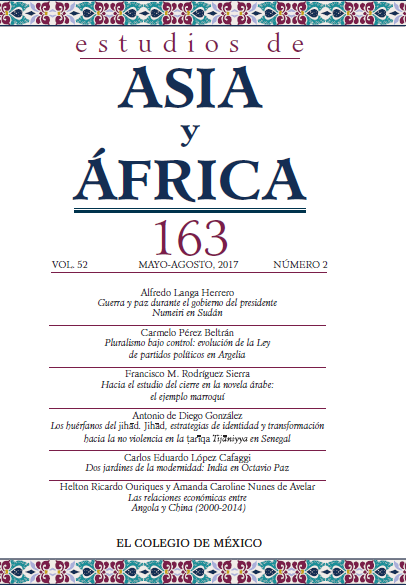Abstract
This article focuses on the ways Octavio Paz perceived India and the biographical factors that influenced his judgements —particularly, his voyages to the subcontinent, first as a tourist and then as Ambassador of Mexico. This text attempts, firts and fore-most, to draw on postcolonial theory to examine Paz’s Eurocentric approach in his essay Vislumbres de la India. I also examine critically his collection of poems Ladera este. This comparison seeks to contrast the affinity and distance of the poet towards his subject of study and devotion. The purpose of this article is dual: to emphasize the importance of India in Octavio Paz’s work (often overlooked by literary critics) and to evaluate his approaches aesthetically and academically.
References
Asiain, Aurelio (ed.), Japón en Octavio Paz, México, Fondo de Cultura Económica, 2014.
Banerjee-Dube, Ishita, Religion, Law and Power: Tales of Time in Eastern India, 1860-2000, Londres, Anthem, 2007.
Bartra, Roger, La jaula de la melancolía: identidad y metamorfosis del mexicano, México, Grijalbo, 1987.
Bhattacharya, Malabika, “Echoes of India: The Poems of Octavio Paz”, India International Centre Quarterly, vol. 25, núm. 1, 1989, pp. 1-19.
Bradu, Fabienne, “Persistencia de la India en Octavio Paz”, en Xicoténcatl Martínez Ruiz y Daffny Rosado Moreno (coords.), Festines y ayunos. Ensayos en homenaje a Octavio Paz (1914-2014), México, Instituto Politécnico Nacional, 2014, pp. 27-37.
Briante, Susan, “Dwelling and Travel: Octavio Paz and El mono gramático”, trans-, núm. 5, 31 de enero de 2008. [, consultado el 5 de septiembre de 2015]. DOI: 10.4000 /trans.243.
Calvino, Italo, Las ciudades invisibles, 23ª ed., tr. A. Bernárdez, Madrid, Siruela, 2013.
Chakrabarty, Dipesh, “La poscolonialidad y el artilugio de la historia: ¿quién habla en nombre de los pasados ‘indios’?”, en Saurabh Dube (ed.), Pasados poscoloniales: colección de ensayos sobre la nueva historia y etnografía de la India, tr. G. F. Toriz, México, El Colegio de México, 1999, pp. 623-658.
Chatterjee, Partha, “Communities and the Nation”, en Saurabh Dube (ed.), Postcolonial Passages: Contemporary History-writing on India, Oxford, Oxford University Press, 2004, pp. 115-131.
Chatterjee, Partha, The Nation and its Fragments: Colonial and Postcolonial Histories, Princeton, Princeton University Press, 1993.
Cross, Elsa, “El erotismo y lo sagrado en Paz”, en Xicoténcatl Martínez Ruiz y Daffny Rosado Moreno (coords.), Festines y ayunos. Ensayos en homenaje a Octavio Paz (1914-2014), México, Instituto Politécnico Nacional, 2014, pp. 17-26.
Dey, Susnigdha, “Indian Themes in Neruda and Paz”, Indian Literature, vol. 19, núm. 2, marzo-abril de 1976, pp. 11-24.
Dhingra, Anil, “La India en la obra de Octavio Paz. Algunas reflexiones”, en Isaías Lerner, Robert Nival y Alejandro Alonso (eds.), Actas del XIV Congreso de la Asociación Internacional de Hispanistas, Nueva York, 16-21 de julio de 2001, t. IV: Literatura Hispanoamericana, Newark, Juan de la Cuesta, 2004, pp. 161- 168.
Dirks, Nicholas B., “Castes of Mind”, Representations, vol. 37, núm. 1, 1992, pp. 56-78.
Dube, Saurabh, “Espacios encantados y lugares modernos”, en Saurabh Dube et al. (coords.), Modernidades coloniales: otros pasados, historias presentes, tr. A. Bartra, México, El Colegio de México, 2004, pp. 99-118.
Dube, Saurabh, Modernidad e historia: cuestiones críticas, tr. A. Muñoz, México, El Colegio de México, 2011.
Dube, Saurabh, Sujetos subalternos, tr. G. Franco y A. Bartra, México, El Colegio de México, 2001.
Durán, Manuel, “La huella de Oriente en la poesía de Octavio Paz”, Revista Iberoamericana, vol. 37, núm. 74, 1971, pp. 97-116.
Grenier, Yvon, From Art to Politics: Octavio Paz and the Pursuit of Freedom, Nueva York, Rowman & Littlefield, 2001.
Hernández, Eunice, “Octavio Paz: la India como un palimpsesto”, Revista de la Universidad de México, núm. 90, 2011, pp. 83-88.
Kushigian, Julia A., “‘Ríos en la noche: fluyen los jardines’: Orientalism in the Work of Octavio Paz”, Hispania, vol. 70, núm. 4, 1987, pp. 776-786.
Mitchell, Timothy, “The Stage of Modernity”, en Timothy Mitchell (ed.), Questions of Modernity, Minneapolis, University of Minnesota Press, 2000, pp. 1-34.
Muñoz García, Adrián, “Vislumbres del Oriente, o la India traducida por Paz”, en Xicoténcatl Martínez Ruiz y Daffny Rosado Moreno (coords.), Festines y ayunos. Ensayos en homenaje a Octavio Paz (1914-2014), México, Instituto Politécnico Nacional, 2014, pp. 113-153.
Nandy, Ashis, “Closing the Debate on Secularism: A Personal Statement”, en Anuradha Dingwaney Needham y Rajeswari Sunder Rajan, The Crisis of Secularism in India, Durham-Londres, Duke University Press, 2007, pp. 107-117.
Nandy, Ashis, “The Politics of Secularism and the Recovery of Religious Toleration”, en Rajeev Bhargava (ed.), Secularism and its Critics, Delhi, Oxford University Press, 1998, pp. 321-344.
Nehru, Jawaharlal, The Discovery of India, Nueva York, The John Day Company, 1946.
Paz, Octavio, “La búsqueda del presente” (discurso de aceptación del Premio Nobel de Literatura 1990), Nobelprize.org, Nobel Media AB 2014. [, consultado el 4 de diciembre de 2015.]
Paz, Octavio, Ladera este, México, Joaquín Mortiz, 1969.
Paz, Octavio, Ladera este, 5ª ed., México, Joaquín Mortiz, 1998.
Paz, Octavio, El laberinto de la soledad, México, Fondo de Cultura Económica, 2007.
Paz, Octavio, El mono gramático, México, Seix Barral, 1974.
Paz, Octavio, Obras completas vii: Obra poética (1935-1998), 2ª ed., Barcelona, Galaxia Gutenberg, 2004.
Paz, Octavio, Vislumbres de la India, Barcelona, Galaxia Gutenberg, 1997.
Paz, Octavio, Vislumbres de la India, Barcelona, Seix Barral, 1995.
Pratt, Mary Louise, Imperial Eyes: Travel Writing and Transculturation, Nueva York-Londres, Routledge, 1993.
Quesada Gómez, Catalina, “De la India a las Indias y viceversa: relaciones literarias entre Hispanoamérica y Asia (siglo XX)”, Iberoamericana. América Latina-España-Portugal, vol. 11, núm. 42, 2011, pp. 43-63.
Ruiz Guadalajara, Juan Carlos, “Mahatma Gandhi en la mirada de Octavio Paz”, en Xicoténcatl Martínez Ruiz y Daffny Rosado Moreno (coords.), Festines y ayunos. Ensayos en homenaje a Octavio Paz (1914-2014), México, Instituto Politécnico Nacional, 2014, pp. 77-111.
Said, Edward, Orientalism, Nueva York, Pantheon, 1978.
Sweeney, John A., “Postnormal Imaginings in Wes Anderson’s The Darjeeling Limited”, East-West Affairs, vol. 2, núm. 1, 2013, pp. 75-98.
Tinajero, Araceli, Orientalismo en el modernismo hispanoamericano, West Lafayette, Purdue University Press, 2003.
This work is licensed under a Creative Commons Attribution-NonCommercial-NoDerivatives 4.0 International License
Copyright 2022 Estudios de Asia y África


